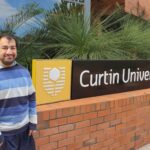Imagine if your fridge was able to scan a microchip in your milk container to determine when you need more, even placing the order with the supermarket. Picture working with a robot that not only accurately builds a product, but also keeps an inventory of its own parts and notifies you when it requires servicing. Curtin’s new Internet of Things MicroMasters program, launching on 27 February 2018, explores technologies and concepts of the future just like these, to educate and upskill the next generation of discoverers, creators and game changers.
According to Microsoft data expert, Mark Toor, the convergence of the physical and digital world has already begun, and it will affect the way we live, work and socialise. Curtin’s Internet of Things program coordinator Professor Iain Murray agrees wholeheartedly.
“The Internet of Things as a concept is basically connecting all the things that we don’t normally consider to be connected to the internet”, says Murray.
“Curtin’s autonomous bus, Kip, is an example of an ‘internet of things’ device, because it reads its surroundings, gathers data about the passengers – where they’re getting picked up, where they’re going, what times the bus is most frequently used – and it senses its environment to avoid harming people or damaging the vehicle”.
The rise of new technology will undoubtedly influence the existing economic and employment landscape1, however, Murray believes that although certain jobs will become obsolete, many more will be created, and businesses positively impacted.
“Approximately 60 per cent of all jobs that exist now won’t in 10 years time. But it’s not job losses, it’s job changes”, Murray explains.
“People will still be making the decisions because computers aren’t good at making intelligent decisions. You need people to decide what’s going to be done, so the jobs of the future will become higher level. They’ll likely be more flexible because if you’re dealing with computers you don’t have to physically be at a specific location anymore. Things will be done quicker, cheaper, usually of a higher quality because there’s less chance of human error. But the jobs will be different; they won’t go away”.
The Internet of Things MicroMasters program comprises six courses, all crafted by industry professionals, including those working within Innovation Central Perth, an industry and research collaboration centre based at Curtin’s Bentley campus.
While the first course provides an introduction to the internet of things, the remaining courses focus on different elements of technology and how they apply in the context of the internet of things, including sensors and devices, networks and protocols, programming and big data, cybersecurity and privacy, and finally a capstone project which involves developing a prototype for potential commercialisation. Upon completion of all six courses, verified students who also have a Bachelor of Engineering degree may use their MicroMasters credential as credit towards Curtin’s Master of Engineering Science (Electrical Engineering).
The MicroMasters is ideal for professionals interested in leveraging their technical and business knowledge, entrepreneurs and innovators, and those looking to start their postgraduate study journey. With over 21,000 enrolments from people around the globe, including USA, Russia and India, the course is already proving to be very popular.
“We’re aiming to bring people of all backgrounds up to the point where they can communicate the requirements and the specifications for an internet of things solution to the technical people who would actually implement it”, Murray says.
“We’ve looked at a multitude of different case studies from manufacturing to agriculture to building management, and how the internet of things is going to affect the way people who are not technically minded are going to do business – so business people, health professionals, educators”.
Find out more and apply by visiting the course page.
1: World Economic Forum Future of Jobs report, 2016



